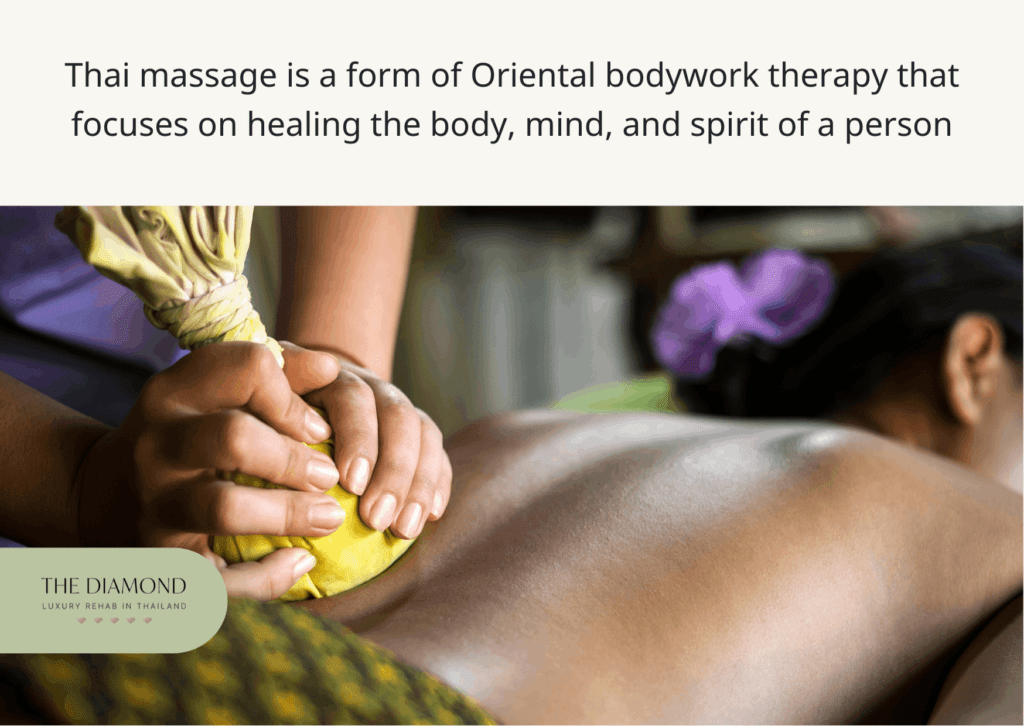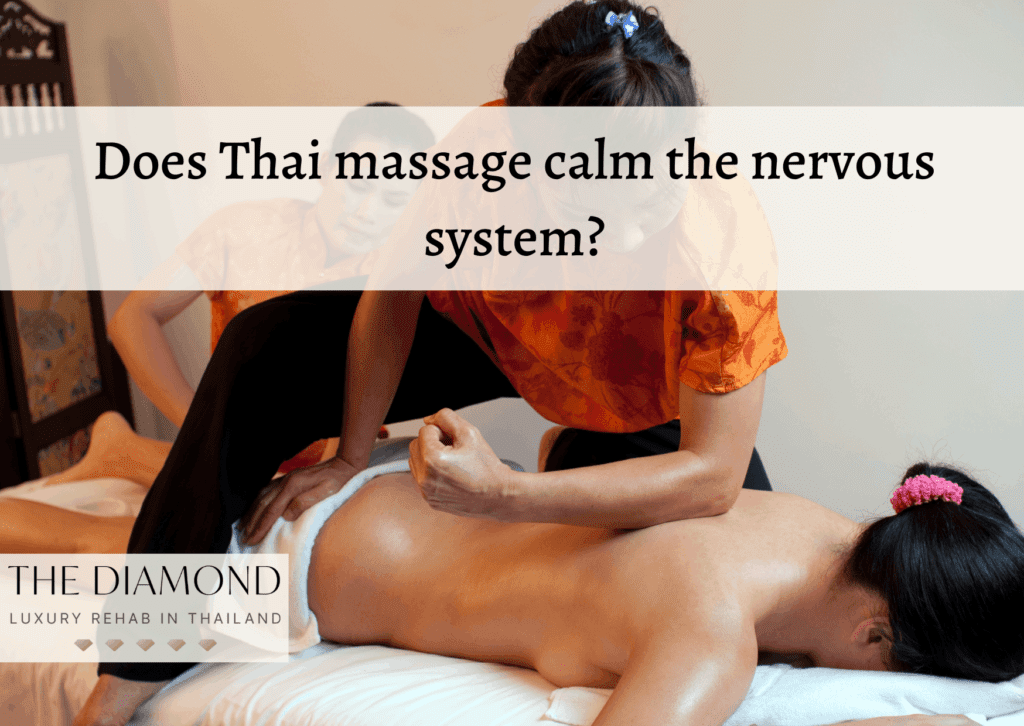9 Thai massage benefits for addiction
Table of content
- 1. Thai massage reduced my withdrawal
- 2. Thai massage enhances interoceptive sensitivity
- 3. Thai massage improves nighttime sleep
- 4. Thai massage can leave us feeling energized
- 5. Thai massage is used to treat specific health problems
- 6. Thai massage made me feel comfortable in my own body
- 7. Thai massage builds trust and self-esteem
- 8. Thai massage helps us take it easy
- 9. Thai massage reduces stress
- What is Thai massage?
- What to know more about Thai massage?

Thai massage is a traditional healing practice and a special type of body work that incorporates aspects of yoga, acupressure, and supported stretching. It has existed for more than 2,500 years.
The purpose of Thai massage is to promote physical and mental well-being by making the joints and muscles more flexible, improving posture, lowering stress, helping with back pain, and reviving mental energy.
The benefits of Thai massage include the reduction of headaches and back pain, improved flexibility and range of motion, and relief from anxiety and joint pain.
Listed below are 9 Thai massage benefits for addiction:
1. Thai massage reduced my withdrawal
Reducing drug withdrawal symptoms means managing the often painful physical and mental symptoms that an individual experiences when they try to stop or reduce their intake of an addictive substance.
Thai massage helps reduce withdrawal symptoms by relaxing the whole body, thus providing relief from physical discomfort, which is a common withdrawal-related symptom.
2. Thai massage enhances interoceptive sensitivity
Interoceptive sensitivity refers to an awareness of one’s own bodily states and feelings. According to a 2019 article entitled, “What Is… Interoception in the Context of Addiction?” from the Society for the Study of Addiction, interoceptive information not only aids in the growth of self-consciousness and metacognition, but also shapes one’s mental body representation, also known as bodily awareness.
Interoception also seems to be negatively affected in the context of addiction. For instance, a 2016 study on the decreased interoceptive awareness in patients with substance use disorders published in the Journal of Substance Use found that compared to control subjects, abstinent patients addicted to alcohol, heroin, or synthetic cannabinoids showed decreased interoceptive accuracy.
Thai massage can help enhance interoceptive sensitivity by promoting deep relaxation and a sense of grounding. When the body is in a relaxed state, it is often easier for internal signals or potential triggers to be noticed and understood before they even reach dangerous levels.
3. Thai massage improves nighttime sleep

An improved nighttime sleep means better sleep hygiene and a more restful sleep, which are critical for proper brain function and memory.
Thai massage contributes to a more restful sleep by reducing feelings of anxiety, boosting relaxation, and lowering stress levels. Improved sleep during addiction recovery can lead to an elevated mood and decrease the risk of relapse due to unpleasant emotions.
4. Thai massage can leave us feeling energized
Feeling energized means being eager, enthusiastic, and determined to do something. People in early recovery frequently have low energy levels, typically brought on by nutritional issues or post-acute withdrawal symptoms.
Fortunately, by relieving physical tension and soothing the nervous system, Thai massage can offer increased mental energy and revitalization, which can aid in building a solid recovery and avoid potential relapse.
It also helps promote mental clarity, which can be beneficial for individuals in recovery who experience mental fog as a post-acute withdrawal symptom.
5. Thai massage is used to treat specific health problems
One of the most well-known Thai massage benefits is that it is intended to address numerous conditions often caused by stress, such as circulation issues, discomfort, and muscle aches.
This can especially be beneficial for individuals who just entered rehab and are still in poor health. Thai massage can aid in treating some health conditions by improving blood circulation and overall muscle strength.
6. Thai massage made me feel comfortable in my own body
Being comfortable in one’s own body means embracing one’s entire self, both the desirable and undesirable aspects. Many people tend to turn to illicit drugs because they feel uncomfortable in their own body, as if they lose touch with it and even view it as an enemy that is constantly at odds with them.
By receiving regular Thai massage, individuals in recovery can develop a deeper connection and acceptance of their bodies, fostering a sense of comfort and self-compassion.
7. Thai massage builds trust and self-esteem

Trust is a firm belief in the ability of someone or something, while self-esteem is a person’s sense of his or her overall personal value or worth. Both are necessary qualities for the development of psychological well-being.
Trusting others is particularly difficult for people in recovery after they have experienced a life of addiction where isolation is very common. Thai massage practitioners prioritize respecting the boundaries and comfort levels of their clients.
They seek consent before engaging in any techniques and adjust the intensity and pressure based on individual preferences. This emphasis on consent and respect can help individuals develop trust in the practitioner and feel empowered in asserting their boundaries, contributing to a sense of self-esteem.
8. Thai massage helps us take it easy
Taking it easy means slowing down even for a bit, taking a break, or not worrying too much about something. Unfortunately, for individuals who engage in substance abuse for an extended period of time, this can be a challenge because the effects of drugs in their brain can leave them mentally overwhelmed.
These adverse effects can manifest as feelings of restlessness and invasive, racing thoughts. Thai massage promotes deep relaxation, activating the parasympathetic nervous system.
This triggers the relaxation response in the body, which helps counterbalance the effects of stress and overwhelm. By inducing a state of deep relaxation, Thai massage can help individuals calm their minds and slow down mentally.
9. Thai massage reduces stress
According to the question & answer page on stress from the World Health Organization, an anxious or tense state brought on by a challenging situation is known as stress. It is a normal human reaction that motivates us to deal with problems and dangers in our lives.
However, exposure to stress early in life or experiencing chronic stress at any time increases one’s risk of developing addiction. Even in early recovery, stress and other effects of substance misuse may linger.
Thai massage incorporates stretching, passive yoga-like movements, and targeted pressure techniques that help release muscle tension and promote relaxation. By easing physical tension and tightness, Thai massage helps alleviate the physical manifestations of stress, leading to a sense of relaxation and relief.
A 2015 study by Sripongngam et al., published in the Medical Science Monitor Basic Research also found that Thai massage significantly reduces levels of sAA (salivary alpha-amylase), a specific stress marker found in saliva.
What is Thai massage?

Thai massage is a form of Oriental bodywork therapy that focuses on healing the body, mind, and spirit of a person. It is rooted in the belief that there is an energy flow throughout the body along specific pathways called Sen lines, and when this energy is blocked or imbalanced, it can lead to discomfort, pain, and illness.
Thai massage dates back over 2,500 years to the time of the Buddha. It is believed that Thai massage in Thailand was developed by a physician named Shivago Komarpaj, who was a contemporary of the Buddha and renowned for his healing abilities.
The techniques and principles of Thai massage were passed down through generations, primarily through oral tradition and practical training within families and Buddhist temples.
What to know more about Thai massage?
Another thing anyone should know about Thai massage is that it differs greatly from a conventional massage in numerous aspects. For instance, Thai massage is often performed on a comfortable mat on the floor, allowing the practitioner to utilize their body weight and leverage during the massage.
Traditional massages are typically conducted on a massage table or chair, with the recipient lying or sitting in a supported position. Moreover, in Thai massage, the recipient remains fully clothed throughout the session, wearing loose and comfortable clothing.
This allows for ease of movement during the stretching and yoga-like postures. Traditional massages typically involve the recipient undressing (except for underwear) and being covered with a sheet or towel, with only the area being worked on exposed.
What are the benefits of Thai massage?
The benefits of Thai massage can be felt physically, mentally, or even spiritually. The benefits of Thai massage are listed below:
- Reduces headaches: Thai massage can help relieve headaches, especially if they are caused by tension, stress, or muscle tightness. By targeting the muscles in the neck, shoulders, and upper back, where tension commonly accumulates, Thai massage can help alleviate muscular tightness that may contribute to headache pain. Furthermore, according to a 2022 article entitled, “Massage Therapy for Migraine” from WebMD, Thai massage is also associated with less severe migraine pain.
- Eases back pain: Thai massage provides relief for back pain by incorporating techniques that target the muscles in the back, such as kneading, compression, and stretching. These techniques help release muscle tension, reduce tightness, and alleviate discomfort associated with back pain.
- Enhances flexibility and range of motion: The stretching and yoga-like movements in Thai massage help improve flexibility, increase joint mobility, and release muscle tension. This can be particularly beneficial for athletes, dancers, or individuals with tight muscles or limited mobility.
- Helps with anxiety: Despite being a more active form of massage, Thai massage has been shown to reduce anxiety and foster a general sense of calm, according to a 2020 article from Healthline titled, “6 Science-Supported Benefits of Thai Massage”.
- Relieves muscle and joint pain: Through targeted pressure and stretching, Thai massage can alleviate muscle aches, stiffness, and joint discomfort. It helps to release tension and promotes better blood circulation, which can aid in pain relief.
How does Thai massage work?

Thai massage works by applying pressure to specific points along energy lines in the body, known as Sen lines. It is believed that these energy lines convey vital life force, and that blockages or imbalances in their flow can cause physical and emotional discomfort.
During a Thai massage, the practitioner applies a variety of treatments, such as compression, and yoga-like stretches and movements, using their hands, thumbs, elbows, knees, and feet. This acupressure, stretching, and mobilizing routine seeks to relieve stress, regain equilibrium, encourage energy flow, and enhance general health.
Both the practitioner and recipient are encouraged to be fully present in the moment during the session. Mindful breathing helps the recipient relax and allows the practitioner to work with greater sensitivity and focus.
Thai massage is highly personalized, with the practitioner adapting the techniques and intensity based on the recipient’s needs, preferences, and physical condition. The massage can be gentle and soothing or more vigorous and invigorating, depending on the individual’s requirements.
However, as with any form of massage or bodywork, there are potential risks and considerations to keep in mind before getting a Thai massage.
These include the risk of worsening muscle pain or injury and discomfort or pain. If Thai massage techniques are applied too vigorously or without proper communication and assessment, there is a risk of muscle strain or injury, or even exacerbating pre existing injuries.
The massage may also cause temporary discomfort or even pain, especially if the recipient has pre-existing injuries or chronic conditions. It’s important to communicate with the practitioner about your comfort level and any specific concerns during the session.
What is the purpose of Thai massage?
The purpose of Thai massage is to promote physical and mental well-being by making the joints and muscles more flexible, improving posture, lowering stress, helping with back pain, and reviving mental energy.
By gently guiding the recipient into various stretches and yoga-like postures, Thai massage aims to increase the pliability of muscles and joints. It also helps improve posture by addressing muscular imbalances, releasing tension, and promoting better alignment.
Through its application of rhythmic pressure and incorporating mindfulness and breath awareness, Thai massage can help induce a state of relaxation, reduce stress levels, and promote a sense of calm and well-being.
Thai massage applies pressure to target specific muscles in the back, alleviating discomfort associated with back pain. It also aims to balance the body’s energy flow by working on specific energy lines and points. When the energy flow is balanced and unobstructed, it can contribute to a sense of revitalization and mental well-being.
How does Thai massage reduce stress?
Thai massage reduces stress through various mechanisms, such as activation of the relaxation response, improvement in blood circulation, and the promotion of mind-body connection.
Thai massage activates the body’s relaxation response, which causes stress chemicals like cortisol to drop and feel-good hormones like endorphins to rise. People thus feel at ease and relaxed, which lowers their stress levels.
It also enhances blood circulation throughout the body through techniques, such as kneading, compression, and stretching. This boost in blood flow helps the body relax, eases muscle tightness, and boosts a sense of well-being, all of which reduces stress.
Thai massage encourages a holistic connection between the body and mind. Through deep breathing, mindfulness, and the practitioner’s focused touch, Thai massage helps individuals become more aware of their bodies and present in the moment.
This mind-body connection supports a sense of grounding and relaxation, allowing individuals to release mental stress and worries.
Does Thai massage calm the nervous system?

Yes, Thai massage is designed to calm the nervous system. The rhythmic, rocking action of Thai massage activates the body’s parasympathetic nervous system.
This is the “rest and digest” part of our nervous system, as opposed to the “fight or flight” mode that many people get stuck in due to constant worry and tension, as stated by an article titled, “What is Thai Massage?” from Thai Transformations.
Thai massage also involves the application of pressure to specific points and energy lines in the body. These points include acupressure sites for relaxation and stress alleviation, as well as locations that have a calming influence on the nervous system.
Can Thai massage help with depression?
Yes, Thai massage can help with depression. In fact, according to a 2019 study on the effect of Thai traditional massage for reduction of depression in Social Welfare Development Center for Older Persons published in the Journal of Medical BioScience, elderly patients with depression may benefit from four consecutive Thai traditional massage sessions.
An article entitled, “Top 5 Reasons to Consider Getting a Thai Massage” from Thai Square Spa also states that an authentic Thai massage aids in internal energy channeling and is thought to be a successful treatment for anxiety, depression, or sensitivity.
It is worth noting, however, that Thai massage should be considered as a complementary approach and not a standalone treatment for depression. Seeking professional assistance from a licensed mental health specialist who can offer a thorough assessment and suitable treatment options is crucial if you are suffering from depression.
They can help you create a personalized strategy that may combine different therapy, such as counseling, medication, and lifestyle changes.

